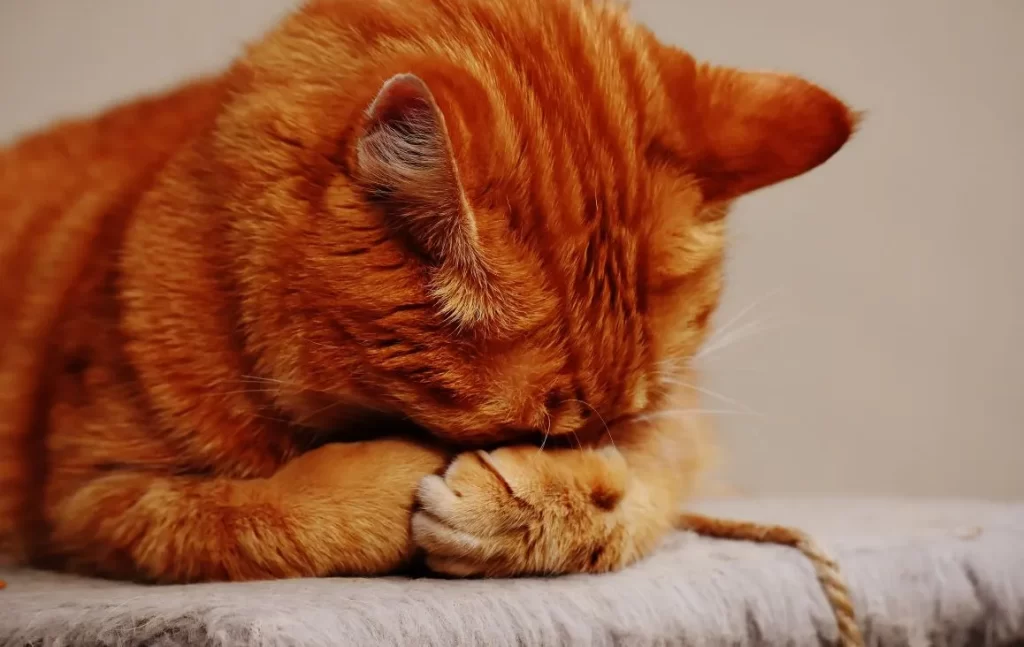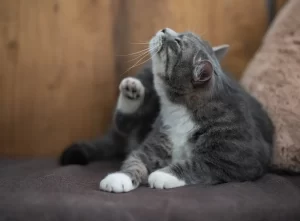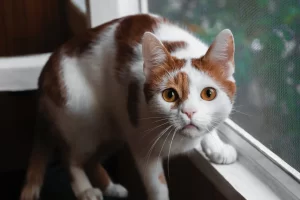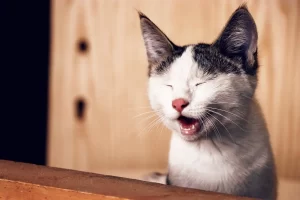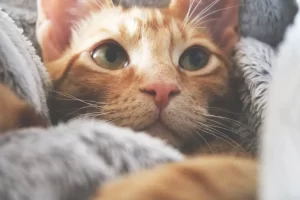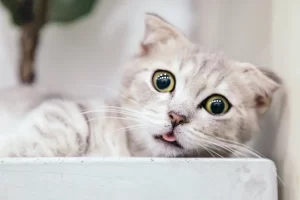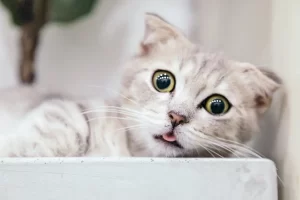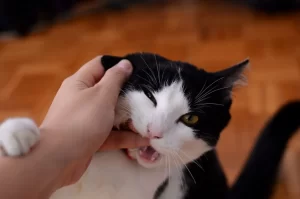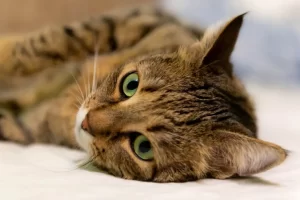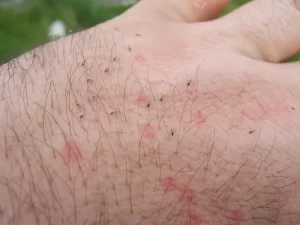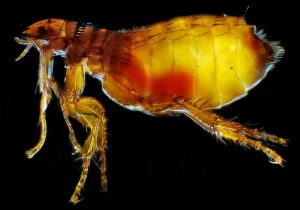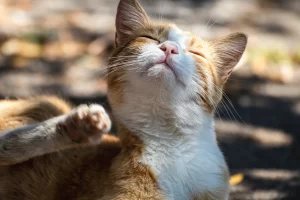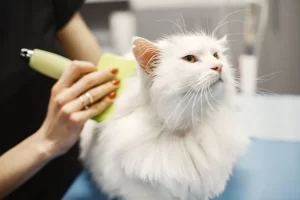Jaundice in cats, also known as hyperbilirubinemia, is a condition characterized by the yellowing of the skin and whites of the eyes. It is caused by an excess of bilirubin, a byproduct of the breakdown of red blood cells, in the bloodstream. While jaundice can be a symptom of a serious underlying condition, it can also be treated at home with proper care and monitoring. In this article, we will cover the causes, symptoms, and various treatment options for cat jaundice, as well as tips for managing the condition at home.
Table of Contents
ToggleWhat is jaundice in cats and what causes it?
Jaundice in cats, also known as hyperbilirubinemia, is a condition characterized by the yellowing of the skin and whites of the eyes. It is caused by an excess of bilirubin, a byproduct of the breakdown of red blood cells, in the bloodstream. Jaundice can be caused by a variety of underlying conditions, including liver disease, cancer, infection, or certain medications.
There are three types of jaundice:
- Hemolytic jaundice is caused by the destruction of red blood cells, which leads to an increase in bilirubin in the bloodstream.
- Hepatic jaundice is caused by liver disease or dysfunction, which impairs the liver’s ability to process bilirubin.
- Obstructive jaundice is caused by a blockage in the biliary tract that prevents bilirubin from being excreted from the body.
It’s important to note that jaundice can also be a symptom of a serious underlying condition and should be evaluated by a veterinarian.
Signs and symptoms of jaundice in cats
The signs and symptoms of jaundice in cats can include:
- Yellowing of the skin and whites of the eyes (icterus)
- Dark urine
- Pale or clay-colored feces
- Loss of appetite
- Weight loss
- Vomiting
- Diarrhea
- Lethargy
- Abdominal pain
Jaundice can also lead to other complications such as anemia, sepsis, and liver failure.
It is important to note that some cats may not show any visible signs of jaundice, but may still have elevated bilirubin levels. Therefore, it is important to monitor your cat’s health and seek veterinary attention if you notice any changes in its behavior or health.
Potential underlying causes of jaundice in cats
There are several potential underlying causes of jaundice in cats, including:
- Liver disease: This can include conditions such as hepatitis, cirrhosis, or cancer, which can impair the liver’s ability to process bilirubin. Home treatments and natural remedies can help keep your cat’s liver healthy over his or her lifetime.
- Hemolytic anemia: This is a condition in which red blood cells are destroyed prematurely, leading to an increase in bilirubin in the bloodstream.
- Blockage of the biliary tract: This can occur due to gallstones, tumors, or other foreign bodies, and can prevent bilirubin from being excreted from the body.
- Infections: Certain infections, such as feline leukemia virus (FeLV) and feline immunodeficiency virus (FIV), can cause jaundice as a secondary symptom.
- Toxins: Cats can be exposed to certain toxins that can lead to jaundice.
- Certain medications: Some medications can cause jaundice as a side effect.
It’s important to note that jaundice can also be a symptom of a serious underlying condition and should be evaluated by a veterinarian. A diagnosis will require a thorough examination, laboratory testing, and sometimes additional diagnostic imaging such as x-rays or ultrasounds.
You may also be interested in: How often do you take a cat to the vet?
At-home treatment of jaundice in cats
Managing jaundice in cats at home will depend on the underlying cause of the condition and the severity of jaundice. It is important to work closely with your veterinarian to monitor your cat’s condition and adjust the treatment plan as needed.
Administering Medications:
- Medications should be given as prescribed by your veterinarian.
- Be sure to give the correct dosage at the correct time, and don’t stop giving the medication without consulting your veterinarian.
Providing a Special Diet:
- Depending on the underlying cause, your veterinarian may recommend a special diet to support your cat’s nutritional needs.
- It’s important to follow the veterinarian’s instructions and provide the appropriate food for your cat.
Monitoring Your Cat’s Eating and Drinking Habits:
- Keep an eye on your cat’s eating and drinking habits.
- If your cat is not eating or drinking enough, it can be a sign of a serious problem and you should contact your veterinarian.
Keeping Your Cat in a Quiet, Stress-free Environment:
- It’s important to keep your cat in a quiet, stress-free environment to help them rest and recover.
- Provide a clean and comfortable place for your cat to sleep
- Avoid loud noises, and try to keep the environment as calm and peaceful as possible.
Keeping Your Cat’s Litter Box Clean and Easily Accessible:
- Make sure the litter box is cleaned frequently and that it is always easily accessible to your cat.
- If your cat is not using the litter box, it can be a sign of a serious problem and you should contact your veterinarian.
Following the Instructions Given by Your Veterinarian for Follow-up Care and Regular Check-ups:
- Your veterinarian will give you instructions for follow-up care and regular check-ups.
- It’s important to follow these instructions and to keep all scheduled appointments.
If your cat is anemic, keep the cat indoors:
Anemia can make cats weak and more prone to injuries, so it’s important to keep your cat indoors to avoid injuries.
Based on the underlying cause, there might be additional at-home treatment options that can be done:
- In case of infection, administer antibiotics as prescribed by your veterinarian and clean and disinfect the cat’s environment.
- In case of liver disease, provide a low-protein diet and avoid giving fatty foods. If the cat has fatty liver disease, consider trying these home treatments if needed.
- In case of cancer, provide a high-calorie diet and make sure the cat is comfortable
It’s important to note that jaundice can be a symptom of a serious underlying condition, so it’s crucial to follow the instructions of your veterinarian and seek veterinary attention if you notice any changes in your cat’s condition or if the cat’s condition worsens. Home management should not replace professional veterinary care and should be done under the guidance of a veterinarian.
managing jaundice in cats at home with a proper diet
Effectively managing jaundice in cats at home involves a critical focus on their diet. The specific dietary approach may vary depending on the underlying cause of jaundice and the recommendations of your veterinarian. However, there are some general guidelines to consider when providing the right diet for a cat with jaundice:
- Opt for high-quality, easily digestible protein sources, which may include cooked eggs, chicken, fish, or turkey.
- Steer clear of foods high in fat, as these can strain the liver.
- Maintain a well-balanced diet that ensures essential vitamins and minerals, like vitamin B and zinc, to promote liver health.
- If your cat is dealing with liver disease, consider a low-protein diet to reduce the burden on the liver.
- If your cat has been diagnosed with cancer, focus on a high-calorie diet to help them maintain their weight.
- In the case of anemia, select a diet rich in iron and vitamin B12.
- Encourage eating and drinking by offering small, frequent portions of food and water throughout the day, especially if your cat is not consuming adequate amounts.
It is of utmost importance to collaborate closely with your veterinarian, who can assess your cat’s condition and make necessary adjustments to the diet. Keep in mind that individual dietary needs can vary, and the guidance of your veterinarian should be followed diligently.
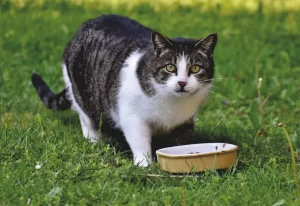
Herbal remedies to treat jaundice in cats at home
Herbal remedies can be beneficial for cats with jaundice, but it’s important to use them with caution and under the guidance of a veterinarian. Herbal remedies can interact with other medications your cat is taking, and some herbs can be toxic to cats. Some herbal remedies that may be beneficial for cats with jaundice include:
- Milk thistle: This herb is believed to have liver-protective properties and may help to improve liver function.
- Dandelion: This herb is a natural diuretic and may help to flush toxins from the liver.
- Artichoke: Artichoke is believed to have a similar effect on the liver as milk thistle
- Turmeric: This herb is known for its anti-inflammatory properties and may help to reduce inflammation in the liver.
- Burdock: This herb is a natural diuretic and may help to flush toxins from the liver.
- Yellow dock: Yellow dock is believed to have a similar effect on the liver as milk thistle and dandelion.
- Schisandra: Schisandra is believed to have a positive effect on the liver and may help to improve liver function.
- Licorice: Licorice is believed to have anti-inflammatory and antioxidant properties and may help to protect the liver from damage.
Here are some general guidelines for the usage and dosing of some of the herbal remedies mentioned above:
- Milk thistle: Milk thistle is usually administered in capsule or tincture form. Doses range from 50-200 mg/kg body weight, given orally, twice a day.
- Dandelion: Dandelion can be given as a tincture or in dried form. Doses range from 1-2 ml of tincture or 1/4 tsp of dried herb per 2.2 lbs of body weight, given orally, twice a day.
- Artichoke: Artichoke can be given in capsule form, doses range from 50-150 mg/kg body weight, given orally, twice a day.
- Turmeric: Turmeric can be given in capsule form or as a spice, added to the diet. Doses range from 50-150 mg/kg body weight, given orally, twice a day.
- Burdock: Burdock can be given as a tincture or in dried form. Doses range from 1-2 ml of tincture or 1/4 tsp of dried herb per 2.2 lbs of body weight, given orally, twice a day.
- Yellow dock: Yellow dock can be given as a tincture or in dried form. Doses range from 1-2 ml of tincture or 1/4 tsp of dried herb per 2.2 lbs of body weight, given orally, twice a day.
- Schisandra: Schisandra is usually administered in capsule or tincture form. Doses range from 50-200 mg/kg body weight, given orally, twice a day.
- Licorice: Licorice can be given as a tincture or in dried form. Doses range from 1-2 ml of tincture or 1/4 tsp of dried herb per 2.2 lbs of body weight, given orally, twice a day.
It is important to note that these are general guidelines and the doses and usage instructions should be adjusted based on the specific herb and the condition of the cat. And also to note that herbal remedies are not a substitute for professional veterinary care and should be used in conjunction with other treatments prescribed by your veterinarian.
Treatments options for jaundice in cats
The treatment options for jaundice in cats can vary depending on the underlying cause of the condition. They can be broadly categorized into the following:
Medical treatment:
- Medications: Depending on the underlying cause, your veterinarian may prescribe medications to treat the underlying condition. For example, antibiotics may be prescribed for an infection, or anti-inflammatory drugs for liver disease.
- Nutritional support: Cats with jaundice may have decreased appetite and weight loss, so your veterinarian may recommend a special diet to support the cat’s nutritional needs.
- Blood transfusion: In case of severe anemia, a blood transfusion may be necessary.
Surgical treatment:
Surgery may be necessary to remove a blockage in the biliary tract, such as gallstones or a tumor.
In case of severe liver disease, surgical options such as liver transplantation may be considered as a last resort.
Supportive care:
- Fluid therapy: Cats with jaundice may become dehydrated, so your veterinarian may recommend fluid therapy to help rehydrate your cat.
- Monitoring: Your veterinarian will monitor your cat’s condition and adjust the treatment plan as needed.
- Follow-up care: Regular check-ups and follow-up care are important for cats with jaundice to ensure proper management of the underlying condition.
It’s important to note that treatment options will be tailored to the individual cat and the underlying cause of jaundice. Your veterinarian will work with you to develop a treatment plan that is appropriate for your cat.
What are the potential complications of jaundice in cats?
Jaundice in cats can be a sign of an underlying serious condition, and if left untreated, it can lead to several potential complications. Here are a few of the potential complications of jaundice in cats:
- Liver failure: Jaundice can be a sign of liver disease, and if left untreated, it can lead to liver failure. This can be a life-threatening condition and may require emergency treatment.
- Toxemia: Jaundice can cause the build-up of toxins in the blood, which can lead to a condition known as toxemia. This can cause severe illness and may require hospitalization.
- Anemia: Jaundice can lead to anemia, which is a condition in which there are not enough red blood cells to carry oxygen to the body’s tissues. This can cause weakness, fatigue, and difficulty breathing.
- Coma: In severe cases, jaundice can cause a coma or even death.
- Cancer: Jaundice can be caused by cancer, which may lead to a poor prognosis and a limited life expectancy for the cat.
It’s important to note that these are potential complications and not all cats with jaundice will experience them. However, if your cat is showing symptoms of jaundice, it’s important to seek veterinary care as soon as possible in order to diagnose and treat the underlying condition, which can help to prevent these complications from occurring.
Jaundice in Cats: Is it Breed-dependent?
Jaundice can affect cats of all breeds. However, some breeds may be predisposed to certain underlying causes of jaundice. For example:
- Siamese cats are predisposed to a liver disease known as cholangiohepatitis.
- Abyssinian cats are predisposed to a liver disease known as hepatic lipidosis.
- Persian cats are predisposed to liver shunts, which are congenital defects that can cause jaundice.
- Maine Coons cats are predisposed to a liver disease known as copper storage disease.
It’s important to note that while these breeds may be predisposed to certain underlying causes of jaundice, any cat can develop the condition. It’s important to have any cat showing symptoms of jaundice examined by a veterinarian in order to determine the underlying cause and provide appropriate treatment.
How to prevent jaundice in cats?
Here are a few ways to help prevent jaundice in cats:
- Regular veterinary check-ups: Regular check-ups with your veterinarian can help to identify and treat any underlying conditions that may be causing or contributing to jaundice. This includes blood work and urine analysis that can detect potential health issues.
- Proper diet: Feeding your cat a nutritionally complete and balanced diet can help to support their overall health and may help to prevent jaundice.
- Vaccinations: Vaccinating your cat against certain infections, such as feline leukemia and feline immunodeficiency virus, can help to prevent infections that can cause or contribute to jaundice.
- Parasite control: Regularly deworming your cat and providing flea and tick prevention can help to prevent parasitic infections that can cause or contribute to jaundice. Check out our guide on how to naturally deworm your cat at home!
- Avoiding exposure to toxins: Cats are very curious by nature and may ingest things they shouldn’t. Keep your cat safe by keeping toxic substances, such as cleaning products and medications, out of reach.
- Managing Chronic illnesses: If your cat has a chronic illness, work with your veterinarian to manage it effectively as it can lead to an exacerbation of symptoms or jaundice.
It’s important to note that while these steps may help to prevent jaundice, they are not foolproof and any cat can develop the condition. If you notice any signs of jaundice in your cat, it’s important to seek veterinary care as soon as possible.
Beneficial supplements and over-the-counter medicines
Supplements and over-the-counter (OTC) medications can be used in the management of jaundice in cats, but it is important to use them under the guidance and supervision of a veterinarian. Some supplements and OTC medications that may be beneficial for cats with jaundice include:
- Milk thistle: This supplement is often used to support liver function and may be beneficial for cats with liver disease.
- SAMe: S-Adenosyl-L-methionine, is a supplement that can be beneficial for cats with liver disease.
- Vitamin E: This vitamin can help to protect the liver from damage and may be beneficial for cats with liver disease.
- Antioxidants: Antioxidants, such as Vitamin C, Vitamin E and beta-carotene, may help to protect the liver from damage and may be beneficial for cats with liver disease.
- Probiotics: Probiotics are beneficial bacteria that can help to support the gut and may be beneficial for cats with liver disease.
It’s important to note that these supplements and OTC medications may not be appropriate for all cats with jaundice and should only be used under the guidance and supervision of a veterinarian.

